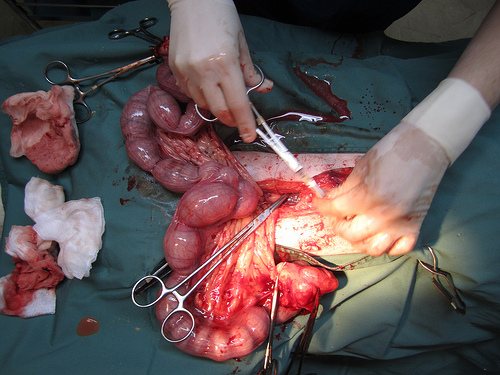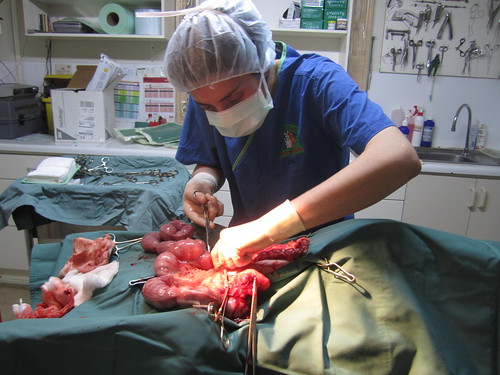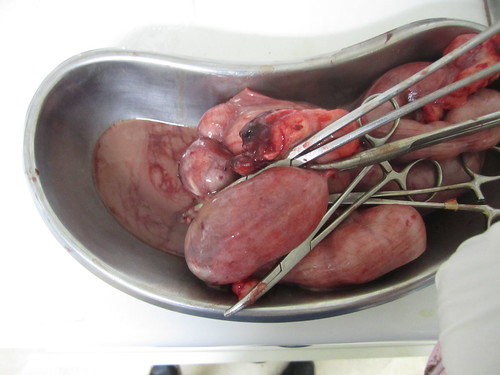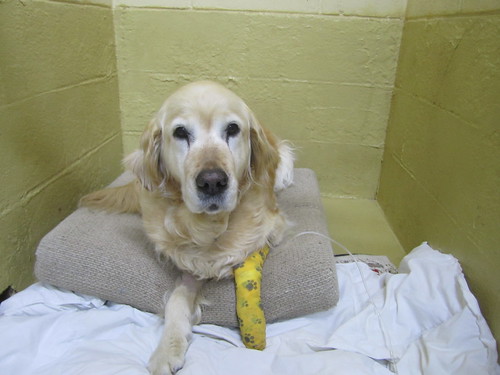Desexing Your Bitch Can Save Her Life�
| Tweet |
I have had a very hectic two weeks�and was also on�emergency call last weekend. I had a major sleep in today and finally feel refreshed and ready to face the world again. My hard work has mostly paid off recently and I have been rewarded by so many of my clients with brilliant gifts. I am humbled and feel so thankful that my efforts have been recognised and my patients have pulled through.
It may seem like such a rhetoric for many people to hear veterinarians recommend desexing their pets.
In all honesty, I�am surprised that�so many people out there still do not desex their�bitches even though they do not intend to breed from them. Why do we recommend desexing your bitch? We simply want to ensure your dog does not develop ‘pyometra‘ which is pus in the uterus or bring in unwanted puppies to the world.
Pyometra�can present in two ways: open versus closed. In open pyometra, the cervix is still open and�there is�pus oozing out of your dog’s vulva�which she will�constantly be licking and that�may or may not�prompt you to get her checked out�by a�vet. As for closed pyometra, the cervix is closed and so no drainage is present and the uterus consequently distends with pus and then ruptures. Both open and closed pyometra are life threatening conditions and usually occur soon after your dog has had a season.
We can not tell which dog is going to develop pyometra.
However, a dog that has had several seasons is at higher risk of developing pyometra.
The only signs that owners seem to notice is that their dog is very thirsty (drinking lots) and appears lethargic. Some owners come home to discover their dog is dead.
I am hoping that the case I am going to�talk about�will really hone in on the importance of desexing your female dogs. It is�crucial to note that I also strongly recommend desexing male dogs too but this won’t be the subject of my article today.
We got called at 4.30 p.m. last Friday regarding ‘Gemma’, a 10-year-old Golden Retriever that had suddenly fallen ill. We were half an hour away from closing the clinic�but she had to be seen. On examination, ‘Gemma’ looked so depressed and had a very high temperature. She was guarding her abdomen and would not allow us to fully palpate it. We admitted her for full workup and hospitalization.
X-rays of her abdomen�showed�a suspect pus filled uterus.
The owner�informed us that he�believes she is desexed and so pyometra is unlikely. We started her on iv fluids�and antibiotics.
The next morning, I did not see any improvement and felt like she had deteriorated in spite of�the aggressive�supportive therapy. ‘Gemma’ had an absolutely horrible smell to her.�I noticed she had a swollen vagina and was still very concerned about pyometra. �She did not have a desexing tattoo in her ear which even made me more suspicious. I repeated her blood work and found she had developed an anaemia overnight. I called the owner immediately and strongly recommended an exploratory laparotomy to determine what is going on in her abdomen. The owners gave me the okay to go ahead with afterhours emergency surgery.
I was going into surgery not knowing exactly what to expect. My gut instinct told me she had pyometra (pus in the uterus) �but a ruptured tumour or an abscess of some sort were some of my other considerations.� As soon as I opened her abdomen, I was flooded with heaps of creamy free abdominal fluid (pus).
My heart sank because I instantly knew that her uterus had ruptured.
There was so much pus in her abdomen and that made her prognosis very guarded.�She was bound to develop a peritonitis (infection of her abdominal cavity).�I tracked her very distended uterus and started doing the tedious job of desexing her. It was quite an intense process because the uterus was so friable and there was so much contamination and I was working in a very un-sterile field.
Gemma’s pus filled uterus (referred to as ‘pyometra’)
Working very�hard to remove this friable and distended uterus.
Resected uterus with pus oozing out of it.
I flushed her abdomen thoroughly but she was still bound to have pockets of pus within her abdominal cavity. She�recovered well from her anaesthetic. I monitored her very closely as I was concerned about post operative bleeding and/or infection.
The next day, she seemed much brighter but was still�not interested in eating.
I repeated her bloods and they showed a very high white cell count (indicating infection). I�increased her antibiotic cover and had her on�a triple antibiotic therapy to cover against all types of bugs. She was still very tender in her abdomen. I did not expect her to bounce back at that stage as I had only operated on her the�night before.
Her whole family came to visit her that day. According to her owners, she usually inhales her food and so they were shattered to see her rejecting her favourite treats. However, ‘Gemma’ managed to�put on a brave face for her family and�even mustered�enough energy to�wag her big beautiful tail for them. They looked into her eyes and could tell she was in a world of pain and simply miserable.
It really saddened me to see the anguish her family felt at seeing her. One of them cried so much because he could not believe how she was not bouncing all over the place. I knew she was a very much-loved dog and they would have desexed her as a young dog had they known they could have avoided this situation. They did not intentionally mean to neglect her.
They returned home with a heavy heart because they�knew that�’Gemma’ was not out of the woods yet.
On Monday, she seemed brighter but was still not interested in eating. The rest of her vitals were good. Blood tests were still indicating a very high infection. We repeated her full bloods to ensure that the rest of her organs were still viable and thankfully her results were absolutely normal. I started to warn the owners that I may need to go back in for repeat surgery to flush her abdomen again and address the underlying peritonitis.
On Tuesday, ‘Gemma’ finally started showing a slight interest in eating. She�even started�hopping on her favourite cushion that her family had�brought in.
Her blood results showed that her white cell count was getting lower indicating response to treatment. We were ecstatic to see those results and decided to send her home on very close monitoring. We held off on surgery because we believed that the antibiotics are finally doing their work. We sent her home with a huge pile of medications. I have kept in touch with her mom and she informs me ‘Gemma’ is showing small improvements each day.�She is due for a revisit next week. I am crossing my fingers for my beautiful ‘Gemma’. She has fought very hard to conquer this battle and I sincerely believe she will triumphantly survive.
For all those pet owners that have bitches that are not desexed and�are not being bred, �I say: ‘Why are you risking your�dog’s life?
Your dog will not always be as lucky as ‘Gemma’?
Filed under: Medicine Cases, Surgery Tagged: abdominal cavity, abscess, aggressive supportive therapy, anaemia, antibiotics, cervix, closed pyometra, depressed, distended uterus, distends, Dog, drainage, emergency, exploratory laparotomy, Golden Retriever, guarded prognosis, high temperature, high white cell count, horrible smell, infection, iv fluids, lethargic, life threatening, neutering, open pyometra, peritonitis, pyometra, ruptured tumour, ruptures, spaying, surgery, swollen vagina, unwanted puppies, Uterus, very thirsty, veterinarians Source: http://rayyathevet.com/2011/10/08/desexing-your-bitch-can-save-her-life/
| Tweet |





Facebook Comments